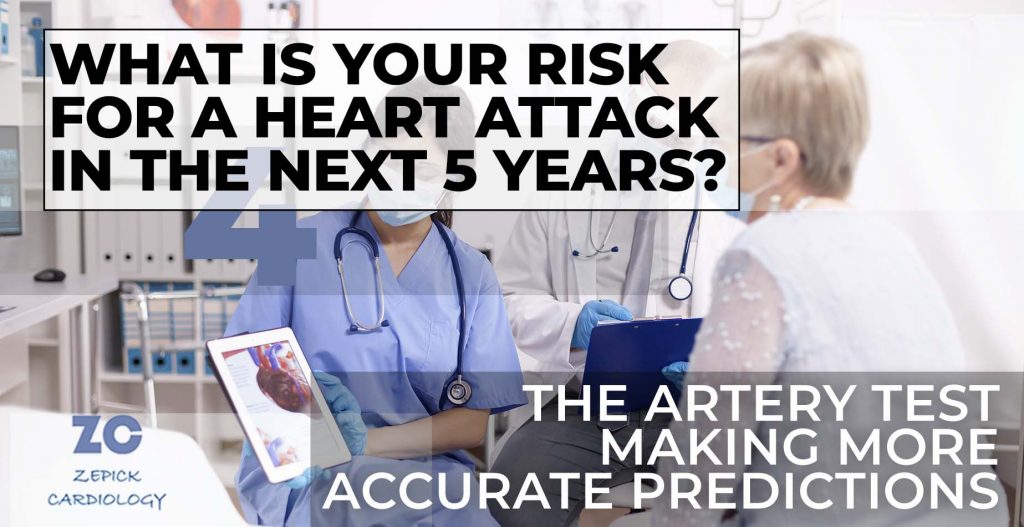How Likely Are You to Have a Heart Attack in the Next 5 Years?
Calcium Tests for Atherosclerosis: A Prime Predictor for Cardiovascular Disease

What puts a person at risk for a heart attack?
You can likely name various issues such as a poor diet, lack of exercise, and cholesterol problems. While those are factors that increase a person’s risk for a heart attack or developing other cardiovascular issues, it only scratches the surface.
We have probably all heard stories of the middle-aged man who ran daily and died of a heart attack, yet a man in his 90s who smoked his whole life never suffered any cardiovascular issue. So, we know there’s more to it than lifestyle.
How can we get a better prediction at who is more likely to face a heart attack or stroke over the next five years? Fortunately, new research that began in the year 2000 has gotten us closer to answering that question. Scientists have learned that one test was vital in identifying an individual’s risk for suffering a heart attack or other cardiovascular problem.

A study was initiated in 2000 to drill down these risk factors to provide a more accurate and early prediction for a given individual’s specific risk. If taking moderate heart-healthy measures are not enough to decrease your specific risk, you would have the information and tools to take additional steps to further protect your heart health.
This study was called MESA, the Multi-Ethnic Study of Atherosclerosis.
Blocked Blood Vessels: Testing for Calcium
For your heart to work well, it needs clear vessels for blood to pump through. When those vessels become blocked or damaged, that is coronary artery disease. The primary cause of coronary artery disease is atherosclerosis.
Atherosclerosis cardiovascular disease is probably something you never heard of, but it is quite common. More than 3 million cases of it are identified in the United States every year. Fortunately, there is treatment for someone with this disease or at risk for developing it.
Testing for atherosclerosis involves looking for calcium in your arteries. While calcium is great for your bones, it can be disastrous for your heart when there is a build-up of it in your arteries. It indicates your arteries may also have a build-up of plaque. Enough plaque in your arteries that harden could lead to a heart attack or stroke.
Having calcium in your arteries is not something you would notice or feel. It requires specific technology to test. Here in Wichita, technicians at Zepick Cardiology perform CAC tests to get this important information on an individual’s unique cardiovascular risks.
The MESA Study was able to determine that finding calcium in the arteries was a preeminent sign for being at risk for heart disease. Simply put, if you had a large amount of calcium in your arteries, you were going to be much more likely to have some cardiovascular event occur within the next few years. Other tests on arteries, while still important, did not lead to as much conclusive evidence for future heart problems.
These calcium tests are so predictive, it helped identify high risk in persons that were considered low risk by American Heart Association guidelines. Reevaluating the risk using this more predictive test meant people could be given beneficial statin therapy who otherwise might not have been prescribed them.
Heart Attack Risks: Understanding your Coronary Artery Calcium Score
Patients who undergo the CAC test are given a rating from 0 to 300. A score of CAC = 0 means there was no calcium detected. A score of over 100 indicates a person who would benefit from a statin treatment.
While it is vital to identify when a person is at increased risk for a fatal condition, it is also incredibly valuable to identify when their risk is low. It can keep a person from taking medications or other treatments when it is not actually necessary for them at this time.
How does one get a coronary calcium screening? First, you would need to have it prescribed by a doctor, either your primary physician or a cardiologist. The test itself is done in a CT scanner.

Bottom Line: The New Impact on Your Heart Treatment
The MESA study has given cardiologists greater knowledge in knowing a person’s specific cardiovascular risks. There are now more signs cardiologists like those at Zepick Cardiology can look to in order to better predict your risks for heart disease. The CAC test to determine calcium levels in your arteries provides an excellent indication if you need to start treatment, such as taking statins.
Should you still worry about making lifestyle choices that are proven to help prevent heart disease? Absolutely. But modern medicine can help make sure you have a clearer picture of what risks you really have and, more importantly, what you should do about protecting yourself.
If you are wondering about your risk factor, you can start by taking the ASCVD risk estimator plus calculator available for anyone online by clicking this link. This will provide you with a 10-year risk estimate for a heart attack or stroke.
If you know your CAC score already, you can enter it into this online CAC score assessment tool to determine how your score compares to others with similar heart disease risks.
If you have questions regarding your coronary artery health or are wondering if you need to undergo a CAC test to determine your individual risks, give Zepick Cardiology in Wichita a call at (316) 616-2020.





